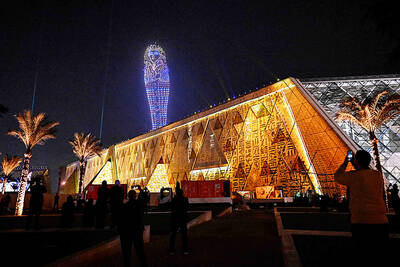European leaders, reaching across the fault lines of last century's battlefields, said on Friday that they had struck a deal on a European constitution, the latest step in the gradual but creaking process toward a more united continent.
Under the agreement, for the first time, the continent -- through the 25-nation EU -- would have a president, a foreign minister and a single rule book to replace the web of treaties that govern the complex relationships among the union's member countries. But the constitution still faces a hard test: ratification by all 25 members, which could be exceedingly difficult in the face of strong skepticism in some countries and voter apathy. At least seven of the nations have decided to ratify the pact by referendum.

PHOTO: AP
While the leaders toasted their success with champagne, the past two days were marked by dogged and at times polarized talks that ended in compromises many participants strongly criticized. Many of the compromises limited the scope of decision-making in sensitive areas such as taxation and social issues. Negotiators inserted what they called "emergency brakes" for countries worried about retaining their national prerogatives, notably Britain.
"We have to move at the pace of the slowest camel in the train," said John Palmer, director of the European Policy Center in Brussels.
The constitution is a legalistic document of nearly 350 articles -- perhaps not what leaders had envisioned when they called for a "more democratic, more transparent and more efficient" system at a meeting two-and-a-half years ago in Brussels.
But it contains a string of innovations. Among them is creation of a European public prosecutor, a sort of nascent federal attorney-general who would be responsible for investigating and bringing to trial those cases where the EU's financial interests are at stake. According to officials, they could involve crimes like fraud in the EU budget or counterfeiting of euro notes and coins. Ultimately the prosecutor could also be responsible for prosecuting "serious crime having a cross-border dimension."
There are also provisions for countries to take part in special combat units if they choose, an issue closely watched by Washington; and for closer cooperation on military procurement.
"This is definitely a step forward," said Marco Incerti, research fellow at the Center for European Policy Studies. "They have increased transparency and simplified the institutions to some extent."
With its demands to keep a national veto on a wide range of issues including taxation and foreign policy, Britain was pitted against France and Germany, whose delegations were grinding their teeth at what they saw as their neighbor's intransigence.

‘CHILD PORNOGRAPHY’: The doll on Shein’s Web site measure about 80cm in height, and it was holding a teddy bear in a photo published by a daily newspaper France’s anti-fraud unit on Saturday said it had reported Asian e-commerce giant Shein (希音) for selling what it described as “sex dolls with a childlike appearance.” The French Directorate General for Competition, Consumer Affairs and Fraud Control (DGCCRF) said in a statement that the “description and categorization” of the items on Shein’s Web site “make it difficult to doubt the child pornography nature of the content.” Shortly after the statement, Shein announced that the dolls in question had been withdrawn from its platform and that it had launched an internal inquiry. On its Web site, Le Parisien daily published a

China’s Shenzhou-20 crewed spacecraft has delayed its return mission to Earth after the vessel was possibly hit by tiny bits of space debris, the country’s human spaceflight agency said yesterday, an unusual situation that could disrupt the operation of the country’s space station Tiangong. An impact analysis and risk assessment are underway, the China Manned Space Agency (CMSA) said in a statement, without providing a new schedule for the return mission, which was originally set to land in northern China yesterday. The delay highlights the danger to space travel posed by increasing amounts of debris, such as discarded launch vehicles or vessel

RUBBER STAMP? The latest legislative session was the most productive in the number of bills passed, but critics attributed it to a lack of dissenting voices On their last day at work, Hong Kong’s lawmakers — the first batch chosen under Beijing’s mantra of “patriots administering Hong Kong” — posed for group pictures, celebrating a job well done after four years of opposition-free politics. However, despite their smiles, about one-third of the Legislative Council will not seek another term in next month’s election, with the self-described non-establishment figure Tik Chi-yuen (狄志遠) being among those bowing out. “It used to be that [the legislature] had the benefit of free expression... Now it is more uniform. There are multiple voices, but they are not diverse enough,” Tik said, comparing it

Prime ministers, presidents and royalty on Saturday descended on Cairo to attend the spectacle-laden inauguration of a sprawling new museum built near the pyramids to house one of the world’s richest collections of antiquities. The inauguration of the Grand Egyptian Museum, or GEM, marks the end of a two-decade construction effort hampered by the Arab Spring uprisings, the COVID-19 pandemic and wars in neighboring countries. “We’ve all dreamed of this project and whether it would really come true,” Egyptian Prime Minister Mostafa Madbouly told a news conference, calling the museum a “gift from Egypt to the whole world from a